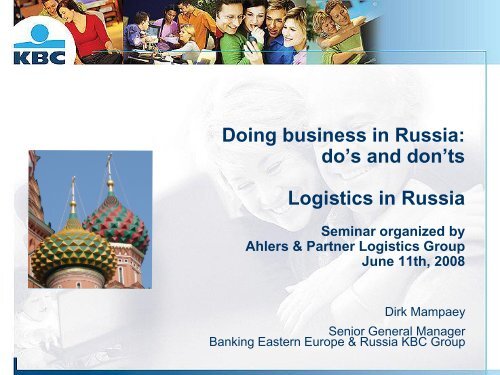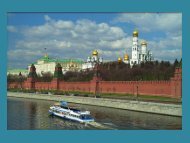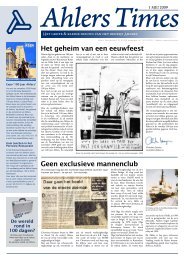KBC Group Central Europe - Ahlers
KBC Group Central Europe - Ahlers
KBC Group Central Europe - Ahlers
You also want an ePaper? Increase the reach of your titles
YUMPU automatically turns print PDFs into web optimized ePapers that Google loves.
Doing business in Russia:<br />
do’s and don’ts<br />
Logistics in Russia<br />
Seminar organized by<br />
<strong>Ahlers</strong> & Partner Logistics <strong>Group</strong><br />
June 11th, 2008<br />
Dirk Mampaey<br />
Senior General Manager<br />
Banking Eastern <strong>Europe</strong> & Russia <strong>KBC</strong> <strong>Group</strong>
Table of content<br />
1<br />
<strong>KBC</strong> <strong>Group</strong> venturing into Russia<br />
2<br />
Success Factors for doing business in Russia<br />
3<br />
Experience so far<br />
2
Why did <strong>KBC</strong> enter the Russian market?<br />
• Russia is a huge market with economic development at a quicker<br />
pace than other CEE countries.<br />
• Investment grade sovereign ratings by major ratings agencies<br />
• Vast natural resources (oil and gas)<br />
• Strong financial discipline (zero net debt position); foreign debts declined<br />
from 90% of GDP in 1998 to 31% in 2006<br />
• Real GDP growth 2002-2007: 4.7 -7.3% p.a.; IMF forecast for 2008: 7.1%<br />
• Banking penetration is low compared to peer countries<br />
• In recent years Russian banks‟ assets grew at an annual rate of 35%<br />
• Retail lending shows the highest growth rates in the banking market<br />
• Comparatively low level of non performing loans<br />
• The banking market is still very fragmented, consolidation is on<br />
its way; competition is rising but margins remain attractive<br />
3<br />
Investment in Russian market is an extension of <strong>KBC</strong>’s<br />
existing presence in <strong>Central</strong> and Eastern <strong>Europe</strong>
How did <strong>KBC</strong> structure its investment?<br />
• Majority control: 95% (5% held by IFC)<br />
• Alignment with minority shareholder through Shareholders‟ Agreement<br />
• <strong>KBC</strong> expatriates nominated in senior management positions<br />
• Absolut Bank has been integrated as a separate division into the<br />
business unit of “<strong>Central</strong> & Eastern <strong>Europe</strong>”:<br />
• Risks are monitored centrally<br />
• Dedicated financial controlling unit in the head office in Brussels<br />
• <strong>KBC</strong> risk standards and methodology are being implemented<br />
• Separated financial statements are disclosed on Russia<br />
• Specific know-how transfer from <strong>KBC</strong> (development of Absolut Bank as<br />
a universal bank)<br />
4
Path to achieve value expected from the acquisition<br />
5<br />
Pre-deal<br />
Phase<br />
December 2006<br />
January 2007<br />
• Fact finding<br />
mission to<br />
Russia<br />
• Strategy for<br />
Russia<br />
approved by<br />
<strong>KBC</strong> <strong>Group</strong><br />
Executive<br />
Committee &<br />
Supervisory<br />
Board<br />
• Contacts with<br />
investment<br />
banks<br />
established<br />
• Targets<br />
identified and<br />
prioritized<br />
Non-binding bid<br />
Deal execution<br />
Phase<br />
February 2007 -<br />
April 2007<br />
• Bidding<br />
process<br />
• Due diligence<br />
• Bid revised =><br />
binding bid<br />
• Contract<br />
negotiations<br />
• Postacquisition<br />
plan<br />
SPA signed<br />
Pre-closing<br />
Phase<br />
May 2007 –<br />
August 2007<br />
• Strategic<br />
imperative for<br />
integration<br />
delineated<br />
• Regulatory<br />
clearance<br />
process<br />
completed<br />
• Integration<br />
approach<br />
defined<br />
• Preparation of<br />
project<br />
organization<br />
• Organizational<br />
Quick Scan<br />
• Management<br />
assessment<br />
SPA closed<br />
RoI expected to reach 10% in 3-5 years<br />
Integration<br />
Phase<br />
September 2007<br />
April 2008<br />
• High-level<br />
strategy for<br />
AB (WHAT)<br />
approved by<br />
<strong>KBC</strong> <strong>Group</strong><br />
Executive<br />
Committee<br />
• Integration<br />
programme<br />
executed<br />
• TO BE design<br />
• Adoption of<br />
<strong>KBC</strong> <strong>Group</strong><br />
policies &<br />
standards<br />
Integration<br />
roadmaps<br />
Post Integration<br />
Integrate<br />
Transform<br />
May 2008 – 2012<br />
• Detailing of<br />
strategy for AB<br />
(HOW)<br />
• Execution of<br />
integration<br />
projects<br />
• Implementation<br />
of <strong>KBC</strong> <strong>Group</strong><br />
policies &<br />
standards<br />
Integration<br />
completed;<br />
Value achieved
Table of content<br />
1<br />
<strong>KBC</strong> <strong>Group</strong> venturing in Russia<br />
2<br />
Success Factors for doing business in Russia<br />
3<br />
Experience so far<br />
6
Success factors for doing business in Russia<br />
Business reality beyond economic data<br />
• Complexity of local market specificity (e.g., unevenly developed market<br />
sectors, regional differences, legislative and procedural framework)<br />
makes it difficult for foreign operators to reap the fruits of the Russian<br />
economic bonanza<br />
• Foreign businessmen‟s expectations of time and expense are<br />
influenced by many factors<br />
• Strong growth dynamics lead to structural changes<br />
• Government goals are evolutionary (see government vision for specific<br />
industries)<br />
• Do extensive market research to identify needs which you can fulfil<br />
• Learn from best practices of other <strong>Europe</strong>an companies<br />
• Strategize a long term plan<br />
• Carefully choose your consultant and local partner<br />
• Be well prepared for negotiations<br />
7
Success factors for doing business in Russia<br />
Red tape<br />
• Nascent legal system results in changing, sometimes unpredictable<br />
business environment; federal legal regime differs from local regimes<br />
• Regulations tend to be demanding<br />
• Differences between Russian accountancy rules & IFRS complicate<br />
integration<br />
• Reporting requirements to local Regulators for certain sectors (e.g.,<br />
banking sector) require careful monitoring<br />
• Plan enough time for the necessary procedures, as they are<br />
often quite time consuming (e.g., formal registration<br />
requirements, licensing requirements, etc.)<br />
• Hire competent local legal expertise (e.g., accuracy of<br />
contracts, intellectual property rights, etc.)<br />
• Do not try to break the system, try to get along …<br />
• Pay your taxes. Otherwise you attract unnecessary attention.<br />
8
Success factors for doing business in Russia<br />
Personnel search & development<br />
• Retaining strategically valuable resources is a key challenge<br />
• Mobility between jobs is high with salaries constantly rising (by 30 per<br />
cent a year)<br />
• Labour market is characterised by shortage of certain skills<br />
• Living conditions for expatriates are difficult<br />
• Real estate prices for offices & housing are high (not only in the<br />
Moscow region)<br />
• Start searching well in advance, particularly in the regions<br />
• Appoint powerful local integration manager (in case of an<br />
acquisition)<br />
• Show critical resources that your company is committed to Russia<br />
and that there is room for them to advance in the organization<br />
• Focus on training and competence management<br />
• Bonuses linked to performance are very effective!<br />
9
Success factors for doing business in Russia<br />
Set-up of the business structures<br />
• Russia has a rich cultural identity that has been shaped and moulded<br />
by its distinguished history and vast geography<br />
• Business practices are characterised by the transition from a<br />
command economy to market economy<br />
• Business practices are characterised by a hierarchical structure;<br />
hands-off management style is often mistaken for weakness<br />
• Russians are „people oriented‟ and will respond to a more personal<br />
approach<br />
• Build an understanding of diversity and local customs<br />
• Respect local rules but play your own game<br />
• Stand firm on major goals and be flexible on details<br />
• Define clearly the structure and areas of responsibilities within the<br />
company<br />
• Cultivate relationship with government agencies at all levels<br />
10
Table of content<br />
1<br />
<strong>KBC</strong> <strong>Group</strong> venturing in Russia<br />
2<br />
Success Factors for doing business in Russia<br />
3<br />
Experience so far<br />
11
Some findings<br />
• The local management of Absolut Bank has strong merits and <strong>KBC</strong> is<br />
strengthening the team with <strong>KBC</strong> management and experience<br />
• Russians display a tremendous spirit of entrepreneurship and strong<br />
drive<br />
• Russians are well-educated people and quick learners<br />
• Conceptual thinking has to be enhanced but once a buy-in has been<br />
obtained, a quick implementation follows<br />
• Good integration results: staff members were adept at changing their<br />
working style to fit with what <strong>KBC</strong> expects<br />
• Integration conducted simultaneously with a successful execution of the<br />
business plans for 2008 (a.o. ambitious network expansion project)<br />
• Issues:<br />
• Human resources & logistics (real estate)<br />
• High rate of change (both internally/ externally)<br />
• But many business opportunities: prioritization is needed!<br />
12
13<br />
Any questions?




